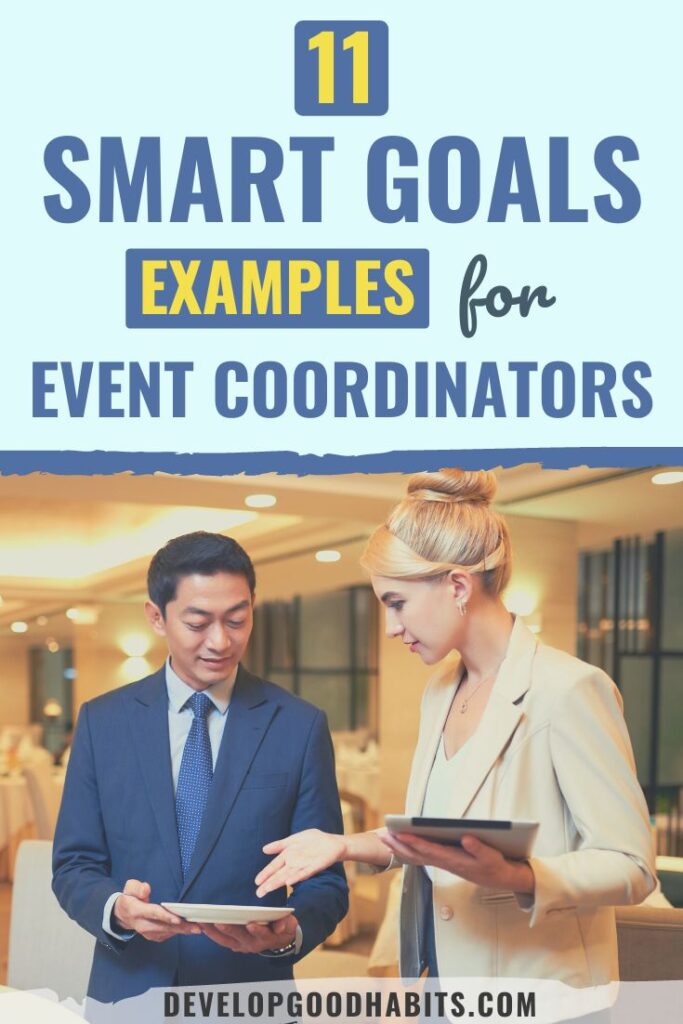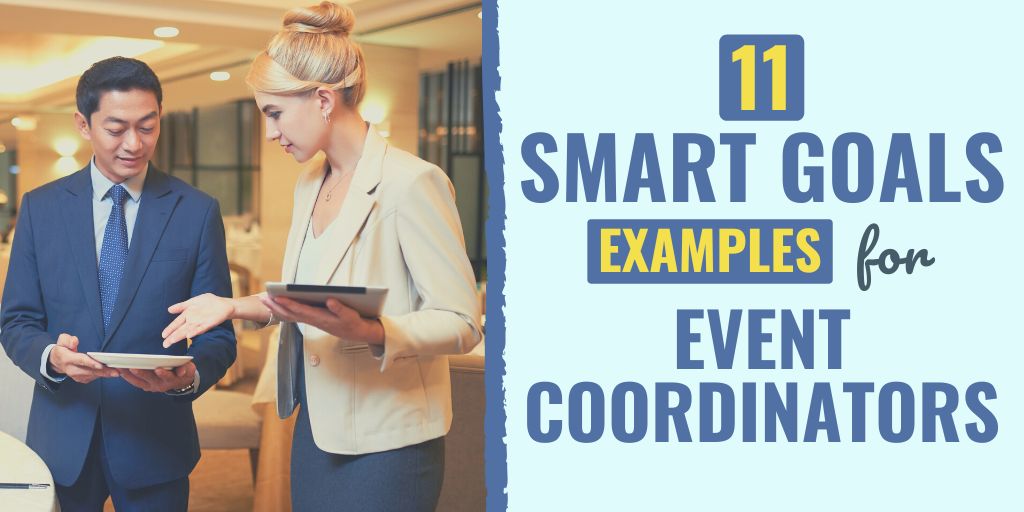There might be affiliate links on this page, which means we get a small commission of anything you buy. As an Amazon Associate we earn from qualifying purchases. Please do your own research before making any online purchase.
An event coordinator has many responsibilities that pose specific challenges, including hiring the correct number of staff, maintaining a budget, networking, dealing with the weather, not having experience, not being organized, etc.
However, the SMART methodology enables you to set goals that can help overcome these challenges.
This article looks at 11 examples of SMART goals for event coordinators. Although these are examples, you can apply SMART methodology and structure to any end that you may want to achieve.
What are SMART Goals?
Before we look at SMART goal examples for event coordinators, we need to know what SMART entails. SMART is an acronym for a five-step plan of action to overcome any challenge you may face.
SMART stands for Specific, Measurable, Attainable, Relevant, and Time-Bound. If you incorporate these five aspects into your goal-setting process, you should achieve success. First, let’s look at what SMART goals are.
If you want to learn more about SMART goals, we recommend reading Ultimate Guide to SMART Goals.
Why are SMART Goals Important for Event Coordinators?
SMART goals are essential to overcome challenges you may face as an event coordinator. So, what are some of the challenges you may face in this position?
One issue is budgeting your time correctly, mainly leaving enough time to set up the event and take everything down. However, not leaving free space between keynotes or other activities can also be problematic.
Moreover, another issue many event coordinators face is not correctly budgeting finances. Unfortunately, going over budget is a problem that happens more often than most would like to admit.
Neglecting to gather specific details and data for your event, such as the return on your investment, is another problem. But, of course, actually making a profit or a return can also be a challenge.

In addition, another common issue faced is having enough staff to properly service the event. Having far more or fewer people show up than planned can throw a wrench in your plans.
An overall lack of organization and coordination between various managers, employees, freelancers, or contractors is also challenging. As you can see, event planning and coordination is not an easy career. However, the SMART goal methodology can make your job easier.
The above challenges can be tackled and overcome using the SMART goal-setting method. It’s all about setting specific goals relevant to an end goal.
Moreover, it’s also about ways to measure how close you are to your goal, especially to a particular timeline. Using SMART goals helps you cover all of the bases.
11 Examples of SMART Goals for Event Coordinators
Now that you know what SMART goals are, here are 11 examples for event coordinators. While not all of these goals may apply to you, the methodology is how you should create all your objectives.
1. Increase Ticket Sales
“My goal is to increase the ticket sales for my next event, one month from now, by at least 25% compared to the last event I coordinated. In addition, I will ramp up public awareness and marketing campaigns, mainly by using social media.”
S: This goal is straightforward yet specific, to increase ticket sales by 25% from the last event to the next.
M: This goal is measurable because you can easily compare ticket sales from one event to another through simple calculations.
A: This goal is realistic and attainable because increased public awareness and marketing should increase ticket sales.
R: Increasing ticket sales is directly related to overcoming challenges as an event manager, particularly in turning a profit.
T: This goal is time-bound, as the goal is to increase sales by the next event, which, in this case, is next month.
2. Increase Profits
“My goal is to increase profits generated by this event by at least 5% compared to the last event. One method I will use is to host a raffle with prizes that entrants can win. If the first raffle is a success, I will double the raffle size for the next event, which should increase profits by another 5%.”
Specific: This goal is clear – to increase initial profits by 5% by hosting a raffle, with a raffle twice the size in the following event granted the first one is a success.
Measurable: This goal is easy to measure as you can easily calculate how much of your overall profit came from this raffle.
Attainable: This is easy to attain and very realistic. A 5% increase is not much, and raffles are popular.
Relevant: This goal is relevant to your success as an event coordinator, which usually hinges on ROI.
Time-Bound: This goal is time-bound, as the aim is to increase profits by 5% at the next event and by another 5% at the following event.
3. Ensure Optimal Communication and Organization
“My goal is to communicate via email and telephone with all relevant parties daily for seven days before the event to ensure everybody is ready and organized.
Second, for proper organization, I will host a meeting with all relevant parties on the morning of the event.
Third, I will summarize the responsibilities of various pertinent parties in detail and what timelines they must follow. This will include the caterers, decorators, keynote speakers, and anybody else of relevance.”
S: This goal is specific: to ensure optimal communication and organization so that the event goes to plan. This communication will regard the responsibilities which all relevant parties have.
M: This goal is measurable because you can easily list all relevant parties you must communicate with and track who you have and have not yet contacted.
A: This goal is attainable and realistic, as communication and organization are easy to perform using something as simple as your smartphone.
R: This goal is relevant because organization and communication between all appropriate parties are essential for an event to be successful. Developing solid communication is a good habit in general.
T: This goal is time-bound, as communication should happen daily for at least a week before the event, with a meeting on the morning of the event.
4. Implement an RSVP System
“To be better organized and ready for everybody that shows up, my goal is to implement a simple RSVP system designed so that people must respond at least 48 hours before the event begins.
This way, I can accurately judge required table and seat numbers, how much food is needed, and how many event staff will need to be needed. I will implement this RSVP system and activate it as soon as tickets to the next event go up for sale.”
S: This goal is specific – to allow for greater organization through an RSVP system that requires guests to RSVP at least 48 hours before the event.
M: Although this goal may not be measurable, it enables you to measure how many people will attend the event, thus contributing to the overall goal of better organization.
A: This is an attainable goal, as RSVP systems are pretty standard.
R: This goal is relevant to the success of an event: You need to know how many people are coming to accurately plan for an event.
T: This goal is timely, as it implements an RSVP system for your next event. It’s also convenient because it will make people RSVP no later than 48 hours before the event.
5. Provide Enough Time for Relaxation and Networking
“I will increase the amount of free time people have between one speaker or activity and the next, from 10 minutes to 15 minutes, giving them more free time to relax and network with each other. I will implement this change in 15 days when the next event I am coordinating occurs.”
S: This goal is specific: to increase breaks between various activities from 10 to 15 minutes to encourage more networking, relaxation, and socialization time.
M: This goal is measurable because you need good time-keeping skills.
A: This goal is attainable and realistic, as adding an extra 5 minutes between speakers or activities should not be a challenge; it’s just simple scheduling.
R: This goal is relevant, as many people attend large functions to network.
T: This goal is time-bound, as the point is to implement this strategy by your next event.
6. Ensure Adequate Staff for Events
“I will increase the number of staff on hand for the next event by 20% (granted, there are roughly the same amount of people attending) because I was short-staffed last event by about 20%.
The goal is to have at least one staff member for every 50 attendees. I will also have an extra 5 staff on call to account for 250 unforeseen attendees. I will implement this staffing change immediately to ensure that all future events are adequately staffed.”
S: This goal is specific: to increase staff by 20% to ensure you have at least one staff member for every 50 guests and have 5 additional staff on call if more people show up than expected.
M: This goal is measurable because you can compare the number of staff you had on hand at the last event to the number of people who attended. You can use various metrics, such as the time needed to serve food to the guests, to indicate whether or not you were short-staffed. This goal is measurable because you can easily count one staff member for every 50 guests.
A: This goal is attainable because many people are looking for jobs. Having enough staff for an event is a simple matter of effective hiring practices.
R: This goal is relevant because you can’t have a coordinated event if you don’t have adequate staffing to execute all necessary functions and aspects.
T: This goal is time-bound, as the aim is to ensure adequate staffing by the next event.
7. Create Plans B and C
“In order to prevent the inevitable stress that follows when trying to replace vendors/presenters who cancel at the last minute, I will make it a habit to have two backups waiting in the wings. These will include florists, caterers, presenters, and any musical performers.
I will initiate this system beginning with my very next event and will continue the process for one year. At the end of the year, I will re-evaluate and determine whether or not two backups are necessary.”
S: You make this specific by stating not only what you plan, but also what areas you plan on making these backups in. You also include timing and a reevaluation date.
M: Keeping a spreadsheet or other chart will allow you to measure this goal.
A: In most cases, this is an attainable goal. The only thing that can hamper it is if there aren't enough people available in your area to choose from.
R: having backups available is definitely relevant to planning a successful event. If you don't have everything a client wants, you will soon lose business.
T: You state when you will start this practice and when you will evaluate. Both of these make this goal time-bound.
8. Hire an In-House Photographer
“Finding a photographer is often difficult. With this in mind, I will invest in hiring an in-house photographer within the next two months who will attend every event over the coming year.
It will be their decision as to whether they need an assistant at any particular event. In this way, I can be sure the photography needs of any event are met.”
S: This goal is specific as you mention hiring the photographer and what they will be responsible for. You also mention a time frame for accomplishing this.
M: Whether or not you hire the person makes this completely measurable.
A: This goal is attainable. You have the power to hire someone and will have the authority to assign them to work at the events.
R: Events often require at least a couple of photos. Having the ability to provide that is good for your reputation.
T: You make this goal time-bound by stating you will have the person on staff within two months.

9. Create a Review Process
“For the next six months, I will sit down with the staff the day after an event to discuss how things went. We will cover what things went well and what things could be made better.
In this way, we can adjust our methods as needed in order to further perfect the process. This will be an ongoing thing from here on out, with evaluations of the results every six months.”
S: This goal is very specific. You mention what you will do, when it will occur, and what will be evaluated at each meeting. You also mention what will be done with the information gleaned.
M: Keeping notes at the meetings will help make this goal measurable as you will have a record of what occurred, or if it even occurred.
A: This is a completely attainable goal. As long as you inform the staff that this process is part of the job.
R: Taking the time to review both the positive and negative things about an event is related to providing a reputable service to people.
T: You mention that this will occur the day following an event and that there will be six-month evaluation periods. This makes the goal a time-bound one.
10. Create an Automated Reminder System
“Within a month, I will hire someone to create an automatic reminder computer program. This will be used for all future events to make sure invited guests are given the chance to put the event on their schedule if they haven't already.
This will help increase the number of guests who attend as well as free up time on my part to take care of other details.”
S: You not only mention a time period for hiring but also mention what the person will be tasked with and why you are doing this. All this makes the goal specific.
M: The success of hiring someone and having the program up and running are all measures of this goal.
A: This goal is attainable as long as you find the right person to write the program. This isn't a big problem these days, so it is doable.
R: Being able to free up time by automating things allows you to be better able to concentrate on the details of the event as well as allow the chance of greater attendance. It is definitely relevant to success.
T: You mention hiring a person within a month. This makes it time-bound, but you can further do this by including how long you plan on giving the person to finish the program and have it working.
11. Keep Abreast of Conflicting Events
“Too often I find planned events coincide with other events such as conventions or holidays and this reduces the number of people attending events.
Starting the first of the month, I will make sure to keep a calendar on my wall that has all events and holidays that may produce a conflict in schedule. This will continue for six months and I will then re-evaluate the effectiveness of this system.”
S: This goal is specific, although you could make it even more so by stating what kind of events you will keep track of. You state when this will start, what you are putting on the calendar, where the calendar will be located, and when you will evaluate success.
M: This is measurable in that you know if you are keeping up with putting events on the calendar and checking before scheduling events.
A: This goal is attainable as long as you stay focused on doing the work and don't forget about it. It will be something you will need to develop a habit for accomplishing.
R: By being able to inform clients of possible conflicts in timing, you further increase your reputation as a good planner.
T: You make this time-bound by stating when you will begin this process and when you will evaluate your system.
Final Thoughts on Smart Goals for Event Coordinators
The SMART methodology organizes your goals and priorities in manageable ways. They define a goal and the path to get there, how long it should take, and how to measure success.
In essence, successful event coordination and SMART goals go hand in hand. Therefore, if you face problems in your events, putting this SMART goal-setting methodology to work is recommended.
And if you want more SMART goal ideas and examples, be sure to check out these blog posts:
- 6 SMART Goals Examples for Nonprofit Organizations
- 7 SMART Goals Examples for Time Management & Productivity
- 7 Examples of SMART Goals for Project Management
Finally, if you want to take your goal-setting efforts to the next level, check out this FREE printable worksheet and a step-by-step process that will help you set effective SMART goals.


